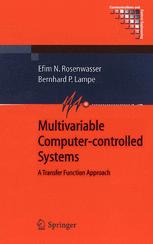

Most ebook files are in PDF format, so you can easily read them using various software such as Foxit Reader or directly on the Google Chrome browser.
Some ebook files are released by publishers in other formats such as .awz, .mobi, .epub, .fb2, etc. You may need to install specific software to read these formats on mobile/PC, such as Calibre.
Please read the tutorial at this link: https://ebookbell.com/faq
We offer FREE conversion to the popular formats you request; however, this may take some time. Therefore, right after payment, please email us, and we will try to provide the service as quickly as possible.
For some exceptional file formats or broken links (if any), please refrain from opening any disputes. Instead, email us first, and we will try to assist within a maximum of 6 hours.
EbookBell Team

4.0
46 reviewsThe transfer function approach is widely used in classical control theory for its easy handling and physical meaning. Although the use of transfer functions is well-established for linear time-invariant systems, it is not suitable for non-stationary systems among which are sampled-data systems and processes with periodically varying coefficients. Computer-controlled continuous-time processes are a very important subset of periodic sampled-data systems which are not treatable using ordinary transfer functions.
Having established the ability of the parametric transfer function to solve this problem for single-input, single-output systems in previous work, the authors extend these methods, which incorporate time-dependence, to the idea of the parametric transfer matrix in a complete exposition of analysis and design methods for multiple-input, multiple-output (MIMO) sampled-data systems.
Multivariable Computer-controlled Systems is divided into three parts:
• Preliminary algebraic material describing the established fundamentals of polynomial and rational matrices necessary for the understanding of later chapters.
• Control problems, important in their own right but which also have a substantial bearing on what follows (eigenvalue assignment and the use of z- and zeta-transforms in discrete systems).
• Frequency methods for the investigation of MIMO sampled-data systems (parametric discrete-time models; stability; stochastic methods; H2 optimization and L2 design).
Appendices covering basic mathematical formulae and the description of two MATLAB® toolboxes round out this self-contained guide to multivariable control systems.
Of special interest to researchers in automatic control and to development engineers working with advanced control technology, Multivariable Computer-controlled Systems will also interest mathematical control theorists and graduate students studying advanced methods of computer-based control.